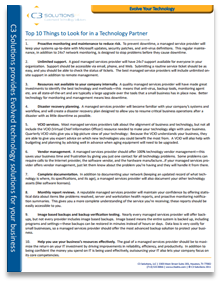If you run a small business, you know that you need to cut costs everywhere you can. With software costs adding up from your ERP to your CRM, software is an appealing place to cut the fat. Why pay more for software you can get for free online?
A common mistake of small business owners is assuming that they can “get away with” a free version of antivirus software, like Avast or a free trial of Nortan Antivirus. These are big brand names, so they should do just fine right?
Not so fast.
While these may (debatably) be good enough for home use, they lack a lot of the major features and updates required protect your business-critical data.
You Get What You Pay For
Free AV software has a number of shortcomings, and many important features are only available with a quality, paid software (which is why, you’ll notice, all of the “free” software will continually bug you to buy their paid upgrade).
- Defense against emerging threats. Free programs only defend against known threats from the threat database maintained by that company. They have been proven to be worse at detecting emerging threats (software that has the characteristics of malware, but have not been added to a threat database), which are more likely to harm your computer.
- Interference with other programs. Free antivirus software commonly interferes with other programs you are running. With paid software, you can customize exclusion rules so that the program knows when conflicting programs are not a threat, and apply it to all computers in the network. This is usually not an option with free programs, which will run any time they’re set to run, regardless of what else is going on.
- No Customer Support. Free software won't offer any support. If something in the software is preventing or interfering with one of your programs, or you’re having trouble accessing files between computers, there’s nowhere you can turn to get help.
- Internet Browsing. Internet browsing activities on your network won’t be covered by free software. Malicious websites are a major source of Trojans, worms, and viruses, and leaving it unprotected is like leaving your windows wide open even as you lock the door.
- Updates, Visibility and Console Management. You can manage your office’s paid antivirus software with a single console. Updates can be made across all computers in the office in minutes, whereas with a free software this must be done individually for each computer. Free antivirus assumes every user will click "OK" to every update (and when’s the last time you clicked OK instead of postponing those updates). With a console, updates are less intrusive, and can be scheduled automatically to run overnight or when they won’t slow down an employee’s machine.
Hodgepodge Solutions Don’t Work
Sometimes, small businesses will run a hodgepodge of free antivirus software to try to cover their bases. They’ll run Microsoft Security Essentials on their servers (which is fine as a minimum, but doesn't constantly scan or protect Internet browsing, it only runs background virus checks). Individual computers will run free trial subscriptions from Norton or Symantec Antivirus that came with the machine, which even if users were updating them, are only as modern as the end of the trial period. Meanwhile, IT lacks oversight and control over protection of the office network as a whole.
The efficiency of managing from a single interface and knowing you are as protected as possible is worth the cost.
More Than Theory
This isn’t just a theoretical best practice. We deal with issues caused by viruses with our clients all the time. Recently, a new client was looking for a fix to an issue with data loss caused by a virus.
Someone at the office unknowingly visited a malicious website and downloaded the virus. The program corrupted all of the files on their computer, as well as all of the files on the shared drive. It changed a little bit of code in every file and made each one unreadable. No matter what kind of repair procedure was used, the files were un-openable.
A major concern with viruses is having your data stolen, but losing data is as big a risk. Not all viruses pull your data and send to someone, some exist just to cause mayhem. In this case, the virus didn’t steal data, it just corrupted years worth of data on their shared drive - accounting files, customer files, literally everything they had put together as a company.
Luckily, they had backups in place. Without the backups, there wouldn’t have been anything they could’ve done. When repair procedures don’t work, the only way to recover the files was to restore versions from the last backup.  Since they had just onboarded with us and now had hourly backups, they were able to recover everything. This is also why it’s important to back up more than once a day.
Since they had just onboarded with us and now had hourly backups, they were able to recover everything. This is also why it’s important to back up more than once a day.
The computer that downloaded the virus this had anti-virus on it, but it hadn’t been updated in a year. This could’ve been avoided entirely with a good, paid antivirus software.
To learn more about what to look for in a technology partner and how they can protect your data and keep your systems up-to-date, download our quick guide on the Top 10 Things to Look for in a Technology Partner.
